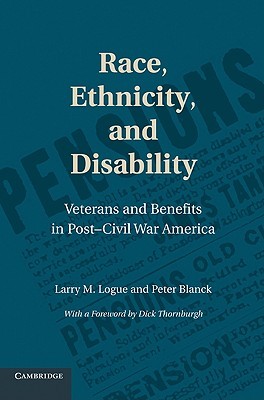
- We will send in 10–14 business days.
- Author: Larry M Logue
- Publisher: Cambridge University Press
- ISBN-10: 052151634X
- ISBN-13: 9780521516341
- Format: 15 x 23.1 x 1.8 cm, kieti viršeliai
- Language: English
- SAVE -10% with code: EXTRA
Reviews
Description
Using data from more than 40,000 soldiers of the Union army, this book focuses on the experience of African Americans and immigrants with disabilities, investigating their decision to seek government assistance and their resulting treatment. Pension administrators treated these ex-soldiers differently from native-born whites, but the discrimination was far from seamless - biased evaluations of worthiness intensified in response to administrators' workload and nativists' late-nineteenth-century campaigns. This book finds a remarkable interplay of social concepts, historical context, bureaucratic expediency, and individual initiative. Examining how African Americans and immigrants weighed their circumstances in deciding when to request a pension, whether to employ a pension attorney, or if they should seek institutionalization, it contends that these veterans quietly asserted their right to benefits. Shedding new light on the long history of challenges faced by veterans with disabilities, the book underscores the persistence of these challenges in spite of the recent revolution in disability rights.
EXTRA 10 % discount with code: EXTRA
The promotion ends in 22d.01:40:39
The discount code is valid when purchasing from 10 €. Discounts do not stack.
- Author: Larry M Logue
- Publisher: Cambridge University Press
- ISBN-10: 052151634X
- ISBN-13: 9780521516341
- Format: 15 x 23.1 x 1.8 cm, kieti viršeliai
- Language: English English
Using data from more than 40,000 soldiers of the Union army, this book focuses on the experience of African Americans and immigrants with disabilities, investigating their decision to seek government assistance and their resulting treatment. Pension administrators treated these ex-soldiers differently from native-born whites, but the discrimination was far from seamless - biased evaluations of worthiness intensified in response to administrators' workload and nativists' late-nineteenth-century campaigns. This book finds a remarkable interplay of social concepts, historical context, bureaucratic expediency, and individual initiative. Examining how African Americans and immigrants weighed their circumstances in deciding when to request a pension, whether to employ a pension attorney, or if they should seek institutionalization, it contends that these veterans quietly asserted their right to benefits. Shedding new light on the long history of challenges faced by veterans with disabilities, the book underscores the persistence of these challenges in spite of the recent revolution in disability rights.


Reviews